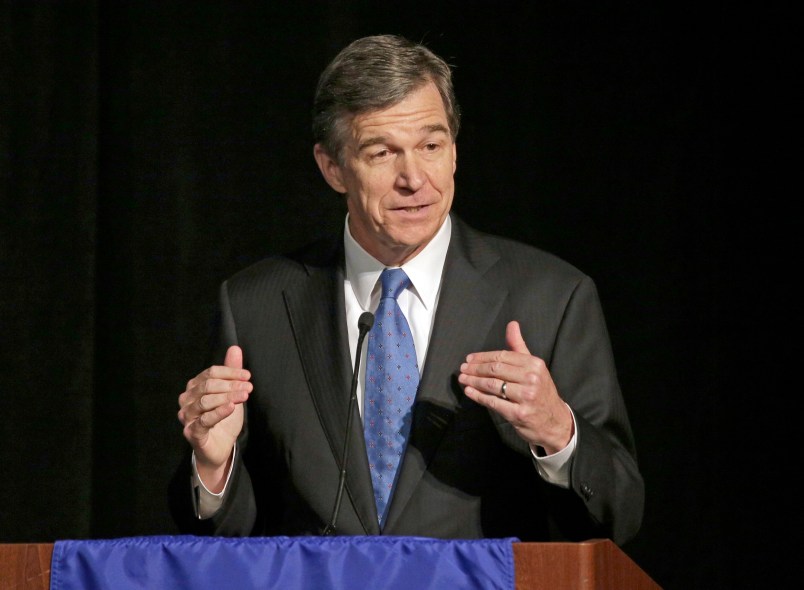Outgoing Republican Gov. Pat McCrory on Monday said he would call a special session to consider repealing the anti-LGBT state law known as HB2 now that the city of Charlotte has repealed its LGBT discrimination protections.
“Governor McCrory has always publicly advocated a repeal of the overreaching Charlotte ordinance. But those efforts were always blocked by Jennifer Roberts, Roy Cooper and other Democratic activists,” McCrory spokesman Graham Wilson said in a statement. “This sudden reversal with little notice after the gubernatorial election sadly proves this entire issue originated by the political left was all about politics and winning the governor’s race at the expense of Charlotte and our entire state. As promised, Governor McCrory will call a special session.”
Roy Cooper, the Democratic governor-elect, said that Republican legislators assured him they would support calling a special session as well.
My statement on today’s Charlotte City Council vote: pic.twitter.com/qNN8pmvSjv
— Roy Cooper (@RoyCooperNC) December 19, 2016
The Charlotte City Council voted on Monday morning to repeal the anti-discrimination ordinance that prompted North Carolina lawmakers to pass HB2. The repeal of the Charlotte ordinance is contingent on the state government repealing HB2 by Dec. 31, 2016.
Here is the ordinance #CLTCC just passed repealing non-discrimination ordinance. #NCGA has until 12/31 to repeal #HB2 pic.twitter.com/JSo3lFBSuZ
— Shawn Flynn (@FlynnShawn) December 19, 2016
Since the Charlotte City Council has pushed for the state to roll back the law before Cooper is sworn in, the repeal would need to be signed by McCrory.
McCrory said in September that he would back a repeal of HB2 if Charlotte entirely eliminated its nondiscrimination ordinance. McCrory’s office indicated at the time that Republican legislative leaders also backed the deal.
The city council had rejected a similar earlier in the year, but the council held a vote on repealing the ordinance after lobbying efforts from Cooper, according to the Charlotte Observer.
Council member Julie Eiselt told the Charlotte Observer that Cooper called her Sunday night and said, “If we cleaned up our books that the General Assembly was motivated to call a special session to repeal (the law) and we felt this was our best opportunity.”
Charlotte Mayor Jennifer Roberts told the Observer that the repeal of the nondiscrimination ordinance “should in no way be viewed as a compromise of our principles or commitment to non-discrimination.”
In early 2016, the Charlotte City Council passed an ordinance to protect LGBT individuals from discrimination and allow transgender individuals to use the bathrooms that corresponds with their gender identity.
In response to the Charlotte ordinance, the North Carolina legislature convened a special session to rush through anti-LGBT legislation. The law, which was quickly signed by McCrory, bans local governments from passing anti-discrimination ordinances and keeps transgender people from using the bathroom that aligns with their gender identity.
The law is best known for its provision banning transgender people from using the bathroom of their choice. But the law also eliminated private employee’s ability to sue their employers in state court for discrimination on the basis of race, religion, color, national origin, age, sex or handicap.
The North Carolina legislature in July passed a small change in the law that restored employees’ ability to sue for discrimination under state law. However, the fix reduced the statute of limitations for those claims from three years to one.
The new law saw national attention and prompted swift backlash from businesses. Citing the anti-gay legislation, PayPal nixed plans to open a new operations center in Charlotte and the NBA pulled the 2017 All-Star game from the city. Despite the criticism, McCrory stood by the law.
However the anti-LGBT law likely cost McCrory his governorship, given that both Donald Trump and Sen. Richard Burr (R-NC) won in the state in 2016. McCrory conceded the governor’s race in December after dragging the race out for nearly a month with claims of widespread voter fraud.
Echoing the rushed special session to usher in HB2, Republican lawmakers called a special session last week to pass legislation that would dramatically curb the next governor’s power. McCrory signed both major bills into law.







I wouldn’t trust them.
Lordy, I hope Cooper didn’t get played.
Charlotte repealed its LGBT discrimination protections?
Charlotte can always pass them again if the legislature doesn’t keep its word.
Hmph.